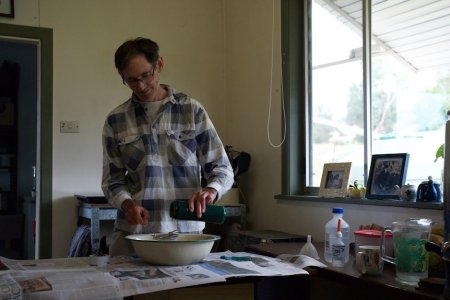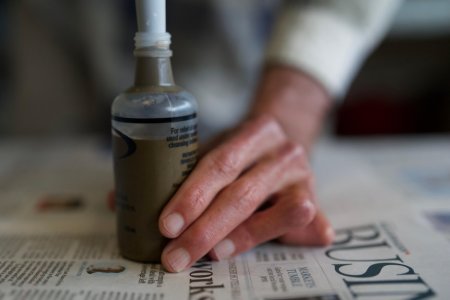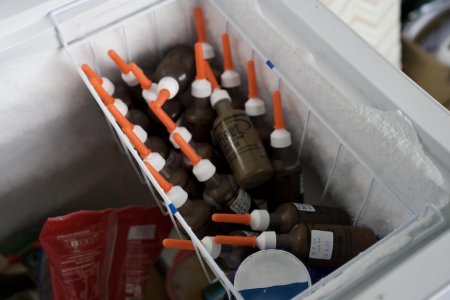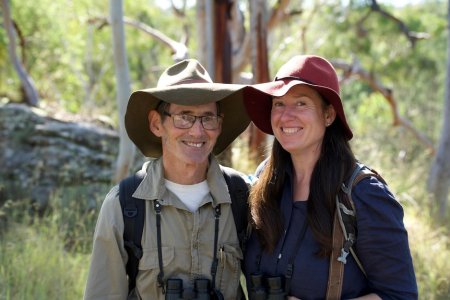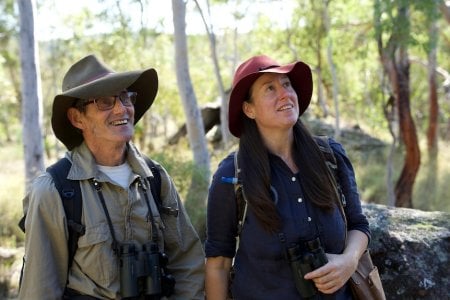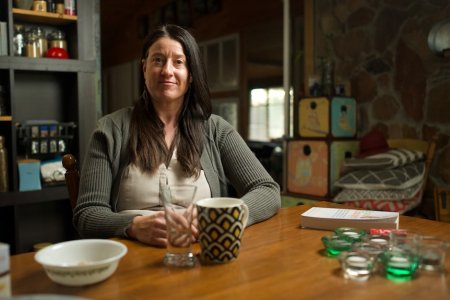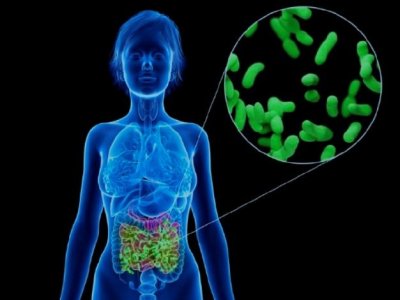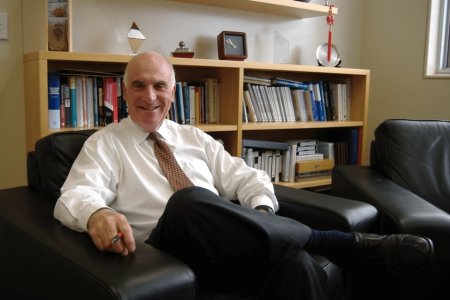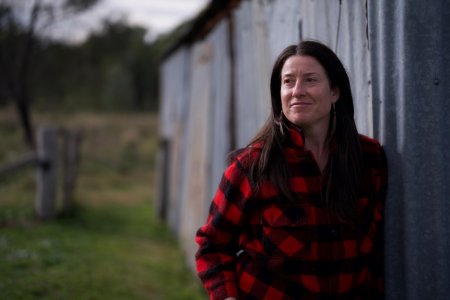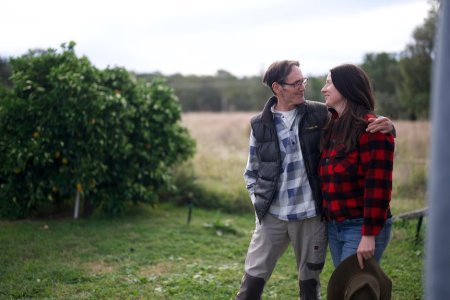Woman says faecal transplant saved her and could help many more like her
By
ABC News
- Replies 0
As the blender blitzed and Jane Dudley prepared for a radical procedure, the concept of being at the forefront of a potentially revolutionary change in the treatment of bipolar disorder was far from her mind.
Mostly, Jane was thinking about how revolted she was by what was about to happen.
But months after her husband Alex, a zoologist with a lifelong interest in ecology, first proposed the "gross" idea to Jane as a way of managing her crippling bipolar, she decided it was worth a try.
"I was at a point of desperation where I felt I can't continue living with this level of suffering," Jane tells Australian Story.
"It was a desperate act."
Eight years ago, Jane began a series of home-administered faecal microbiota transplants (FMT), or "poo transplants", with the hope it would "take the edge off" her mental illness, which had led to her being hospitalised multiple times.
The couple took Alex's faeces, blended it with saline, passed it through a sieve, put the slurry into an enema bottle and "then head down, bum up, squeeze it in".
To Jane's astonishment, as the months went on, she began "to feel joy for no reason".
"I started to have self-esteem for no reason," she says.
"I started to have motivation."
It was a world-first use of FMT to cure bipolar and experts were stunned.
Jane's psychiatrist, Russell Hinton, monitored Jane's progress during the treatment.
He describes the change in Jane as "bordering on miraculous".
Gordon Parker of the University of NSW's psychiatry faculty said Jane's recovery through FMT was one of the most exciting developments in his 50 years of psychiatry.
But Jane and specialists warn that the DIY method she had turned to carries significant risks — including death — if the faecal donor is not properly screened.
There is a risk that serious disease, obesity or antibiotic resistance can be transferred from an unscreened donor to a recipient.
It's why there is now a push to raise $10 million to enable the Food and Mood Centre at Deakin University to run a randomised control trial of faecal transplants for depression.
"The fact that people are finding my story and doing DIY FMT … scares me because I'm worried that people are going to get even sicker, that it's not going to work, or they're going to end up with an autoimmune disease or have a severe reaction, which just speaks to the urgency of why we need clinical trials now," Jane says.
"We need them funded now."
It's a campaign that Jane believes could bring relief to millions of people living with depression and bipolar worldwide — and it all began with a frog.
Transfixed, she found the name of a frog expert and sent off a message and a photograph to him. His name was Alex Dudley.
Alex quickly advised Jane that the emerald-dotted frog was not rare or endangered, as she imagined, but a Peron's tree frog. A very common frog.
But to the couple, it was a magical frog because from the moment they started talking, their lives were destined to be forever intertwined.
"It was bafflingly fast. Before I even laid eyes on her physical self, I was confident that Jane was the one. We just connected," Alex says.
Within the first 20 minutes of a 10-hour chat, Jane told Alex she had bipolar 1 disorder. He had a loose understanding of the mental illness but no concept of the extreme highs and lows that Jane experienced.
Over the ensuing months, Alex learned how Jane had been a bright, sporty kid with expectations of going to university and becoming a professional soccer player. But, by her teenage years, anxiety crept in.
Then, at age 15, she was sexually abused by an uncle she didn't grow up with.
An extended bout of tonsillitis and glandular fever followed and the illness and her mental health conspired to keep her from school. Jane said she dropped out at year 11 and "lost myself for the next 18 years".
For vast chunks of time, Jane's depression was so severe she could not get out of bed or tend to her basic needs, requiring family or friends to look after her. At times, she was suicidal.
Jane would flip into mania, where she would travel to other planets and speak with aliens.
"I would be talking to spirits … I would feel like I had godlike powers and that I was the chosen one," she says.
Written by Leisa Scott and Vanessa Gorman, ABC News.
Alex says it was only when Jane went into psychosis that he realised the severity of her mental illness.
He still becomes emotional when he recalls the lows that Jane would reach.
"She wasn't living … she wasn't living in a way that was sustainable," he says, choking back tears.
Alex became desperate to help the woman he loved.
"I never dreamed about running away from her or being frightened off by this. I was like, 'How can I help?'" he says.
Alex knew that the gut biome — a range of bacteria, viruses, fungi and other microbes in the gut — influenced the production of serotonin and dopamine, neurotransmitters that were crucial for mood and motivation.
He recalled Jane's stories of being given large amounts of antibiotics over almost two years to combat her tonsillitis. He figured that her gut biome could have been starved and diminished by the antibiotics.
Alex delved into the scientific literature and came across a study in which the faeces of a depressed human were put into a rat. The rat developed depression. He wondered if that could be reversed.
"Suddenly, everything just fell into place," Alex said.
"This could work."
"Jane's story knocked my socks off," he said.
"It was a story that caused me to say 'wow' and keep on saying 'wow' for quite a long time."
Professor Parker interrogated the details of Jane's recovery — speaking to her psychiatrist Dr Hinton, analysing her medication intake, consulting gut specialists — and it stood up to scrutiny.
He has since written a book, A Gut Mood Solution, presenting five FMT case studies other than Jane's, including one of his own patients. Two of those people have experienced remission.
"The concept of our gut microbiome and how that might be actually influencing our mood for the worst or for the better is the new paradigm and that has huge implications in terms of managing mood disorders," Professor Parker says.
"We've now got strongly suggestive evidence that we have an intervention that will help people with intractable mood disorders, be it depression or bipolar. We now need the science to be put in place."
It confounds Jane that the Food and Mood Centre has been unable to attract funding for a clinical trial despite being ready to launch after conducting a successful pilot study based on her case.
"If we can show with clinical trials that faecal transplant could help a large proportion of people with serious mental illness, the social impact will be huge, but also the financial impact," she says.
Jane says she believes the faecal transplant has saved the government at least $250,000.
No longer is she on medication, no longer does she need the disability support pension, no longer is she being hospitalised every year.
"By resolving my bipolar symptoms, we have saved the government potentially millions of dollars," Jane says.
"And I'm one person."
"The reason I am alive and well and can feel joy for no reason and like myself is because of one man, Alex," she says.
"He has saved me … in every way that another human being can be saved."
The weight she gained from bipolar medication has fallen away and she is now focused on a healthy diet to "keep my gut bugs happy".
The couple grow their own vegetables and cook predominantly plant-based food from scratch, eschewing processed food.
"In a very real way, the number twos cured my blues," she says.
Her university ambitions returned and, having completed high school at TAFE, she is now in the second year of an environmental science degree, with plans to become a field ecologist.
Jane calls Alex the hero of her fairytale, a man whose unshakeable love for a broken woman led to a radical hypothesis that, in Jane's case, set her free.
"Woman meets frog, frog leads woman to man, man and woman fall in love," she says.
"Man cures woman's incurable illness with his magic poo, thus breaking the curse."
Written by Leisa Scott and Vanessa Gorman, ABC News.
Mostly, Jane was thinking about how revolted she was by what was about to happen.
But months after her husband Alex, a zoologist with a lifelong interest in ecology, first proposed the "gross" idea to Jane as a way of managing her crippling bipolar, she decided it was worth a try.
"I was at a point of desperation where I felt I can't continue living with this level of suffering," Jane tells Australian Story.
"It was a desperate act."
Eight years ago, Jane began a series of home-administered faecal microbiota transplants (FMT), or "poo transplants", with the hope it would "take the edge off" her mental illness, which had led to her being hospitalised multiple times.
The couple took Alex's faeces, blended it with saline, passed it through a sieve, put the slurry into an enema bottle and "then head down, bum up, squeeze it in".
To Jane's astonishment, as the months went on, she began "to feel joy for no reason".
"I started to have self-esteem for no reason," she says.
"I started to have motivation."
'Miraculous' change stuns experts
Now, all those years on from that first tentative blending, and without a manic episode since September 2017, Jane feels confident in saying she has been cured of an illness psychiatry labels incurable.It was a world-first use of FMT to cure bipolar and experts were stunned.
Jane's psychiatrist, Russell Hinton, monitored Jane's progress during the treatment.
He describes the change in Jane as "bordering on miraculous".
Gordon Parker of the University of NSW's psychiatry faculty said Jane's recovery through FMT was one of the most exciting developments in his 50 years of psychiatry.
But Jane and specialists warn that the DIY method she had turned to carries significant risks — including death — if the faecal donor is not properly screened.
There is a risk that serious disease, obesity or antibiotic resistance can be transferred from an unscreened donor to a recipient.
It's why there is now a push to raise $10 million to enable the Food and Mood Centre at Deakin University to run a randomised control trial of faecal transplants for depression.
"The fact that people are finding my story and doing DIY FMT … scares me because I'm worried that people are going to get even sicker, that it's not going to work, or they're going to end up with an autoimmune disease or have a severe reaction, which just speaks to the urgency of why we need clinical trials now," Jane says.
"We need them funded now."
It's a campaign that Jane believes could bring relief to millions of people living with depression and bipolar worldwide — and it all began with a frog.
How Jane met Alex
It was November 2013 when Jane popped her arm through her raincoat and, as her hand emerged, there sat "a very beautiful frog".Transfixed, she found the name of a frog expert and sent off a message and a photograph to him. His name was Alex Dudley.
Alex quickly advised Jane that the emerald-dotted frog was not rare or endangered, as she imagined, but a Peron's tree frog. A very common frog.
But to the couple, it was a magical frog because from the moment they started talking, their lives were destined to be forever intertwined.
"It was bafflingly fast. Before I even laid eyes on her physical self, I was confident that Jane was the one. We just connected," Alex says.
Within the first 20 minutes of a 10-hour chat, Jane told Alex she had bipolar 1 disorder. He had a loose understanding of the mental illness but no concept of the extreme highs and lows that Jane experienced.
Over the ensuing months, Alex learned how Jane had been a bright, sporty kid with expectations of going to university and becoming a professional soccer player. But, by her teenage years, anxiety crept in.
Then, at age 15, she was sexually abused by an uncle she didn't grow up with.
If this story has raised issues for you:
- 1800 Respect National Helpline: 1800 737 732
- Lifeline (24-hour crisis line): 131 114
- Suicide Call Back Service on 1300 659 467
- Beyond Blue on 1300 22 46 36
- Full Stop Australia: 1800 385 578
- Bravehearts: counselling and support for survivors of child sexual abuse: 1800 272 831
- Child Wise: counselling provider: 1800 991 099
An extended bout of tonsillitis and glandular fever followed and the illness and her mental health conspired to keep her from school. Jane said she dropped out at year 11 and "lost myself for the next 18 years".
For vast chunks of time, Jane's depression was so severe she could not get out of bed or tend to her basic needs, requiring family or friends to look after her. At times, she was suicidal.
Jane would flip into mania, where she would travel to other planets and speak with aliens.
"I would be talking to spirits … I would feel like I had godlike powers and that I was the chosen one," she says.
Written by Leisa Scott and Vanessa Gorman, ABC News.
Alex says it was only when Jane went into psychosis that he realised the severity of her mental illness.
He still becomes emotional when he recalls the lows that Jane would reach.
"She wasn't living … she wasn't living in a way that was sustainable," he says, choking back tears.
Alex became desperate to help the woman he loved.
"I never dreamed about running away from her or being frightened off by this. I was like, 'How can I help?'" he says.
Alex knew that the gut biome — a range of bacteria, viruses, fungi and other microbes in the gut — influenced the production of serotonin and dopamine, neurotransmitters that were crucial for mood and motivation.
He recalled Jane's stories of being given large amounts of antibiotics over almost two years to combat her tonsillitis. He figured that her gut biome could have been starved and diminished by the antibiotics.
Alex delved into the scientific literature and came across a study in which the faeces of a depressed human were put into a rat. The rat developed depression. He wondered if that could be reversed.
"Suddenly, everything just fell into place," Alex said.
"This could work."
The push for a full FMT clinical trial
Professor Parker said the fact that FMT — a procedure already approved to manage a severe gut infection — did cure Jane's bipolar could represent a paradigm shift in the way some mental illnesses were treated."Jane's story knocked my socks off," he said.
"It was a story that caused me to say 'wow' and keep on saying 'wow' for quite a long time."
Professor Parker interrogated the details of Jane's recovery — speaking to her psychiatrist Dr Hinton, analysing her medication intake, consulting gut specialists — and it stood up to scrutiny.
He has since written a book, A Gut Mood Solution, presenting five FMT case studies other than Jane's, including one of his own patients. Two of those people have experienced remission.
"The concept of our gut microbiome and how that might be actually influencing our mood for the worst or for the better is the new paradigm and that has huge implications in terms of managing mood disorders," Professor Parker says.
"We've now got strongly suggestive evidence that we have an intervention that will help people with intractable mood disorders, be it depression or bipolar. We now need the science to be put in place."
It confounds Jane that the Food and Mood Centre has been unable to attract funding for a clinical trial despite being ready to launch after conducting a successful pilot study based on her case.
"If we can show with clinical trials that faecal transplant could help a large proportion of people with serious mental illness, the social impact will be huge, but also the financial impact," she says.
Jane says she believes the faecal transplant has saved the government at least $250,000.
No longer is she on medication, no longer does she need the disability support pension, no longer is she being hospitalised every year.
"By resolving my bipolar symptoms, we have saved the government potentially millions of dollars," Jane says.
"And I'm one person."
An epic love story with 'a bit of poo'
The way Jane sees it, this is an epic love story that "just happens to involve a bit of poo"."The reason I am alive and well and can feel joy for no reason and like myself is because of one man, Alex," she says.
"He has saved me … in every way that another human being can be saved."
The weight she gained from bipolar medication has fallen away and she is now focused on a healthy diet to "keep my gut bugs happy".
The couple grow their own vegetables and cook predominantly plant-based food from scratch, eschewing processed food.
"In a very real way, the number twos cured my blues," she says.
Her university ambitions returned and, having completed high school at TAFE, she is now in the second year of an environmental science degree, with plans to become a field ecologist.
Jane calls Alex the hero of her fairytale, a man whose unshakeable love for a broken woman led to a radical hypothesis that, in Jane's case, set her free.
"Woman meets frog, frog leads woman to man, man and woman fall in love," she says.
"Man cures woman's incurable illness with his magic poo, thus breaking the curse."
Written by Leisa Scott and Vanessa Gorman, ABC News.

